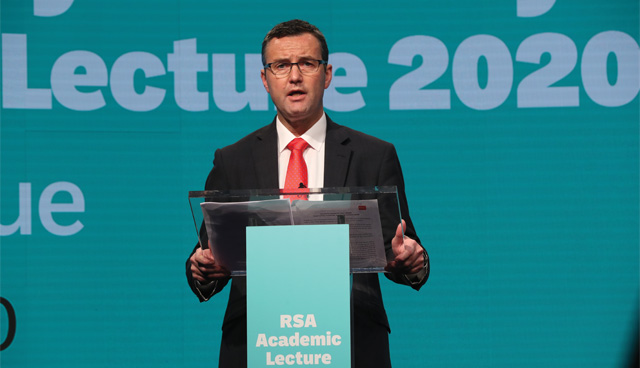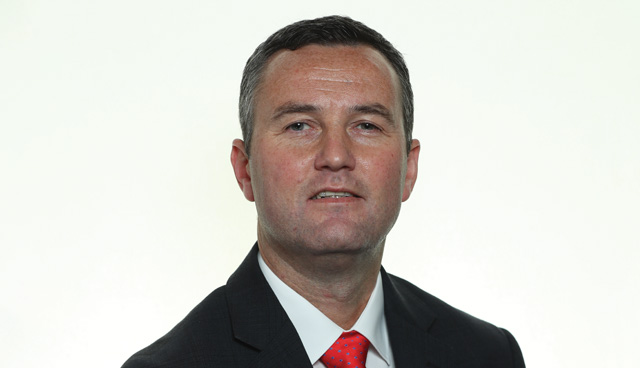Road Safety Authority: Vision Zero

Chief Executive Officer of the Road Safety Authority (RSA), Sam Waide, discusses the transformational nature of the forthcoming government Road Safety Strategy 2021–2030.
Contextualising that the Covid-19 pandemic has accelerated the modal shift of transport in Ireland, Waide, who took up post in September 2020, explains that the Government’s Road Safety Strategy 2021–2030 seeks to encompass and build upon emerging trends.
Due to be published later in 2021, following public consultation at the end of 2020, the Vision Zero and Safe System approach is to be adopted in the Government’s fifth road safety strategy since 1998 and is identified by Waide as a new approach.
“There has been significant progress in road safety in Ireland in the reduction of both fatalities and serious injuries. In 1998, we recorded circa 470 fatalities, compared to 2020, when that figure was 149. That is a positive downward projection but going forward we need to go beyond the status quo. We need transformation within road safety,” explains Waide.
The CEO says that transformation is necessitated by “ambitious” and “challenging” targets. The Programme for Government includes a promise to introduce the Vision Zero principle through the new road safety strategy and targets include a 50 per cent reduction in road fatalities and serious injuries by 2030 before a zero target for 2050.
“That’s a significant challenge given that we have made really good progress in Ireland with regards to road safety. It is a massive challenge and requires nothing less than transformation,” Waide explains. Adding: “That transformation must be societal and the strategy out to 2030 involves a wide range of government delivery bodies and stakeholders from communities to employers and employees, working in partnership.”
Waide addresses several key themes embedded in the strategy, including one which has been fed back from various delivery partners and that is the increased need for data sharing to better inform decision-making and required interventions.
The RSA CEO believes that data and technology have a significant role to play in both road and wider public safety, specifically in relation to infrastructure. Pointing to inclusion in the strategy of international benchmarking, Waide says that better information for road users through in-vehicle technology and interconnectedness with traffic systems presents both opportunities and challenges for road safety.
Discussing the role of technology more broadly, he says: “Covid-19 has served to highlight that new technology can be embraced quickly when there is a pressing need. Through the likes of autonomous driving and in-vehicle technology, there will be an opportunity to embrace technology and leverage that for safety benefits. This opportunity also creates space for government and government bodies to lead by example in their procurement of vehicles that have the highest Euro New Car Assessment Programme [NCAP] safety status.”
A second key theme is that of behavioural changes. The Chief Executive says that the pandemic has activated enhanced awareness of the need for protections for vulnerable road users, as more people walked and cycled. However, he stresses that the behaviours of all road users need to change and improve.
Despite the assumption that less travel in 2020 would automatically lead to less deaths and serious injuries on Ireland’s roads, Waide points to a recognition by the RSA of a continued prevalence of ‘dangerous behaviours’ on the roads in 2020. These include speeding, distractions, vehicle users not wearing a seatbelt and; in addition, An Garda Síochána has recorded a rise in drug and drink driving.

“Ten years is a long-term strategy and so we have proposed three phases within the strategy to allow for us to put in place the right governance and interventions for projects to ensure they are most effective and have a positive impact.”
“These are behaviours we need to work in partnership to address and reduce. That will come as a dual approach. Firstly, working in a positive way to raise awareness of those behaviours and encourage change. Secondly, through enforcement, which will continue to be an important part of reducing those dangerous behaviours.”
A third key element of the strategy described by Waide is the inbuilt ability to “measure, monitor and recalibrate”.
“Our Vision Zero focus going forward is based on international best practice of safe systems and a major part of that is monitoring, reporting, and recalibrating, where necessary. Ten years is a long-term strategy and so we have proposed three phases within the strategy to allow for us to put in place the right governance and interventions for projects to ensure they are most effective and have a positive impact,” he explains.
Interconnectedness
The CEO points to a cognisance within the strategy of the importance of interconnectedness with various other government policies, including the climate change agenda and the modal shift in transport, driven by the pandemic.
“We need to be able to embrace the future of transport, including those emerging modes and interpret what that means for road safety. That means assessing what legislative and regulatory changes are required to facilitate those different, cleaner modes of transport.”
Waide explains that part of this new interconnected approach is a focus on safer travel to work. Part of the governance structure being proposed by the RSA is working on an ongoing basis with employers to identify how they can support road safety initiatives and help change behaviours.
Broader interconnectedness will also aide with what Waide describes as the “policy and legislative challenge”. Stressing that, at a minimum, government, departments and the RSA must ensure regulations keep pace with societal changes, he reiterates that greater data sharing should better inform and increase the pace of policy and legislation.
“If we cannot keep up with how things are changing both on our roads and with vehicle technology then that will be a growing challenge,” he asserts.
Waide is quick to point out that the RSA’s influence in improved road safety stretches further than Ireland. The RSA continues to work with the European Transport Safety Council and the EU Commission on road safety. Highlighting the RSA’s influence on European policy, the Chief Executive points to their successful lobbying of EU member states which saw the timeframe for legislation on intelligent speed assistance within vehicles brought forward from 2027 to 2025.
“As an organisation we have a vision of becoming a centre of excellence for road safety in Ireland and leading road safety in Europe,” he explains.
Concluding Waide says that the forthcoming strategy is purposefully challenging and points to the inclusion of “transformational” targets that will require a wide range of extraordinary measures.
“Our main objective is challenging, but simple: Ireland can achieve Vision Zero, and lead other EU members and neighbouring countries by becoming an exemplar society in road safety. While confident of success, we are pragmatic and realise that change will take time. Nonetheless, every positive step plays a part along the way,” he adds.
T: 096 25000
E: info@rsa.ie
W: www.rsa.ie






